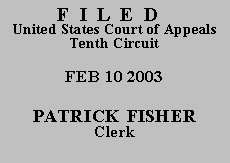

| LAWRENCE L. KELLY,
v.
JUDGE JAMES P. O'HARA; JUDGE
RICHARD D. ROGERS; UNITED
STATES OF AMERICA |
No. 02-3423 D.C. No. 02-CV-4078-JAR |
Before SEYMOUR, MURPHY, and O'BRIEN,
Circuit Judges.
After examining the briefs and appellate record, this panel has determined unanimously that oral argument would not materially assist the determination of this appeal. See Fed. R. App. P. 34(a)(2); 10th Cir. R. 34.1(G). The case is therefore ordered submitted without oral argument.
Lawrence L. Kelly, proceeding pro se, appeals the district court's dismissal of his civil rights complaint brought pursuant to 42 U.S.C. §§ 1981 and 1982. This court exercises jurisdiction pursuant to 28 U.S.C. § 1291 and affirms.
Kelly filed the instant action against United States Magistrate Judge James P. O'Hara, United States District Judge Richard D. Rogers, and the United States of America. The essence of Kelly's allegations is that Judge O'Hara and Judge Rogers ruled in favor of certain defendants in a prior lawsuit brought by Kelly, even though, according to Kelly, his previous complaint was clearly meritorious. In its order dismissing the instant action pursuant to Federal Rule of Civil Procedure 12(b)(6), the district court patiently explained to Kelly that Judge O'Hara and Judge Rogers were absolutely immune from suit for money damages. See, e.g., Mireles v. Waco, 502 U.S. 9, 9-10 (1991) (per curiam). The district court further explained that neither of the very narrow exceptions to absolute judicial immunity--the exception for nonjudicial actions and the exception for actions taken in complete absence of jurisdiction--were implicated by Kelly's allegations. See generally id. at 11-12. In particular, the district court noted that issuing pre-trial orders and granting summary judgment were clearly judicial functions and that the district court clearly had jurisdiction to hear and resolve the previous civil rights suit filed by Kelly which formed the basis of the allegations in the instant complaint. Finally, the district court explained that Kelly's allegation of bad faith on the part of the defendant judges was not sufficient to overcome judicial immunity. See id. at 11 ("Judicial immunity is not overcome by allegations of bad faith or malice . . . ."); Pierson v. Ray, 386 U.S. 547, 554 (1967) ("[I]mmunity applies even when the judge is accused of acting maliciously and corruptly."). As to Kelly's claims against the United States, the district court observed that the United States was immune from suit as a sovereign. See United States v. Mitchell, 445 U.S. 535, 538 (1980). Furthermore, the United States had not waived its sovereign immunity for constitutional torts, see Bivens v. Six Unknown Named Agents, 403 U.S. 388, 410 (1971), and Kelly had not identified any explicit waiver of immunity. Because Kelly could not amend his pro se complaint to overcome these infirmities, the district court dismissed the complaint with prejudice.
In his brief on appeal, Kelly simply asserts, without any citation to authority, that "[t]he Federal District Court can't stop me from sueing [sic] anyone. The Laws I used are adequate and appropriate." For those reasons ably set out in the district court's order of dismissal dated November 15th, 2002, this assertion is wrong. Upon close consideration of Kelly's brief on appeal and de novo review of both the district court's order of dismissal and the entire appellate
record, this court AFFIRMS for substantially those reasons set out in the district court's order of dismissal.
ENTERED FOR THE COURT
PER CURIAM
*. This order and judgment is not binding precedent, except under the doctrines of law of the case, res judicata and collateral estoppel. The court generally disfavors the citation of orders and judgments; nevertheless, an order and judgment may be cited under the terms and conditions of 10th Cir. R. 36.3.